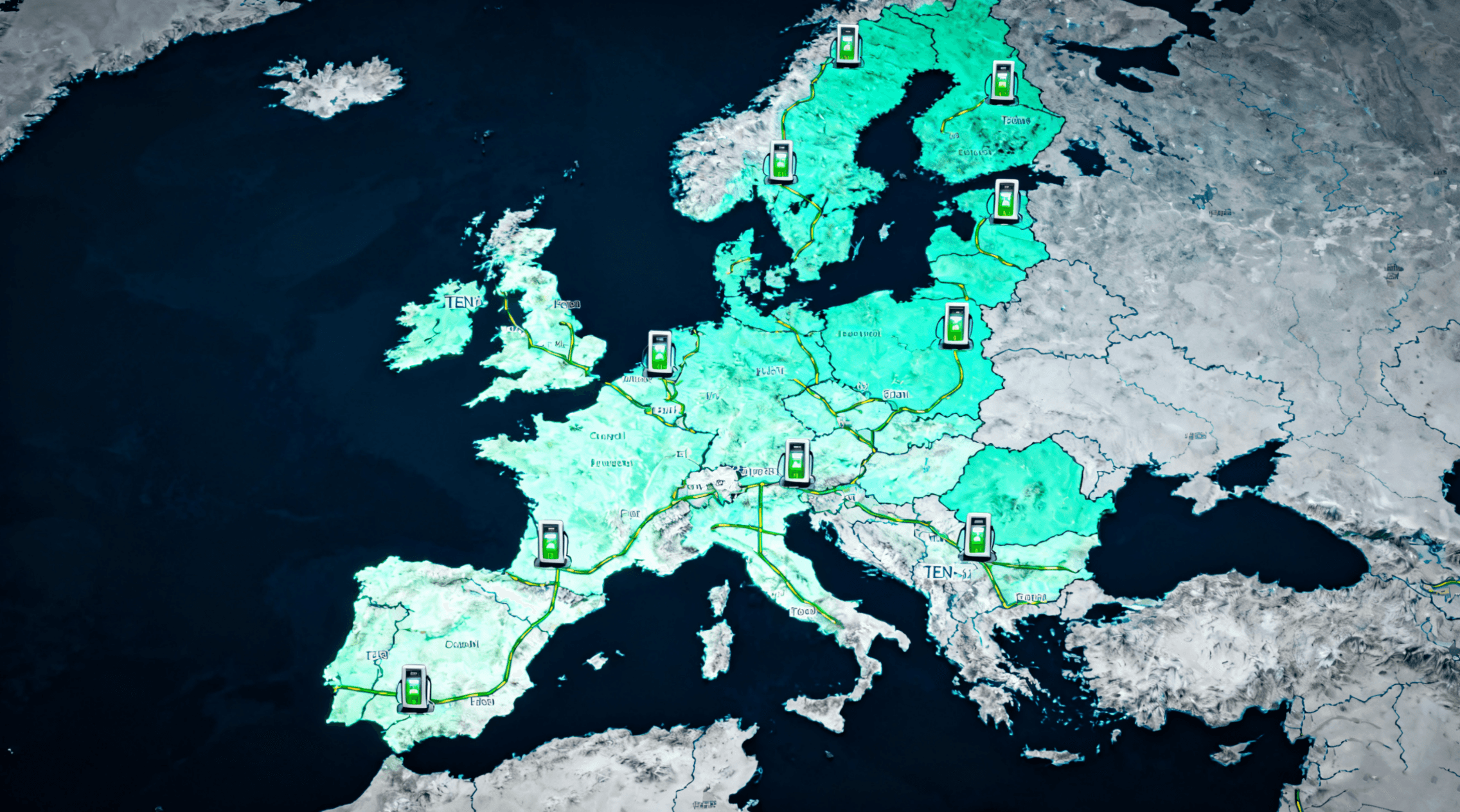ECS Capitalizes on EU's Ambitious EV Incentives for Global Expansion

**April 15, 2026 ** - EV CHARGE SOFTWARE (ECS), a trailblazer in the overseas EV charger operation and maintenance domain, is seizing the moment as the European Union (EU) rolls out an array of far-reaching incentives for electric vehicle (EV) charging infrastructure and new energy vehicles. These initiatives are not only accelerating the EU's transition to a low-carbon future—aligned with its Green Deal goal of carbon neutrality by 2050—but also opening up vast opportunities for ECS to expand its footprint and enhance its services across the region.
EU's Ambitious Charging Infrastructure Blueprint
The EU’s commitment to sustainable transportation is anchored in the Alternative Fuels Infrastructure Regulation (AFIR), a landmark policy setting binding targets for member states to build out a seamless, high-powered charging network.
1. Infrastructure Density Goals
Light Vehicle Charging
By end-2025:
- Along trans-European transport network (TEN-T) core roads: 1 charger every 60 kilometers (each direction) to eliminate "range anxiety" for long-distance travel.
- Each charging pool: Minimum 400 kW total output, with at least 1 port delivering 150 kW+ (supporting fast charging for most EV models).
By end-2027:
- Charging pool output requirement rises to 600 kW total, with more high-power ports (350 kW+) to accommodate next-gen EVs.
Heavy-Duty Vehicle (HDV) Charging
To decarbonize freight, the EU has set aggressive HDV charging targets:
- By end-2025: 15% of TEN-T road networks must have HDV charging pools (minimum 1,400 kW total output, with at least 1 port at 350 kW+).
- By end-2030: 100% of TEN-T core roads will include HDV charging, supporting the phase-out of diesel trucks by 2040.
2. Technical Standardization for Interoperability
To ensure chargers work seamlessly across borders and with all EV models, the EU mandates phased compliance with the EN ISO 15118 series (governing charger-vehicle communication):
- January 8, 2026: All new/renovated public chargers must adhere to EN ISO 15118-1 (terminology), -2 (protocols), -3 (data layers), -4 (compatibility testing), and -5 (conformance testing).
- January 1, 2027: All new public/private chargers must support EN ISO 15118-20:2022; "Plug & Charge" enabled chargers (for automatic authentication) must additionally comply with EN ISO 15118-2:2016.
ECS supports EU clients by:
- Customizing its software platform to track charger output, TEN-T coverage, and EN ISO 15118 compliance in real time.
- Providing technical validation to ensure chargers meet standards, enabling features like "Plug & Charge" and smart grid integration.
EU's Incentives to Spur EV Adoption
Beyond infrastructure, the EU and its member states offer targeted incentives to boost consumer and business uptake of EVs.
1. Financial Incentives for Consumers
Member states deploy direct subsidies to lower upfront EV costs, with examples including:
- Germany: Up to €6,000 for battery-electric vehicles (BEVs) priced under €45,000 (reduced to €4,500 for vehicles over €45,000 but under €65,000).
- France: €5,000 for BEVs under €47,000 (plus an extra €1,000 for low-income households).
- Netherlands: €2,950 for new BEVs, with additional rebates for trade-ins of old gasoline/diesel cars.
These subsidies have driven a 32% year-over-year increase in EU EV sales (2025 data from the European Automobile Manufacturers Association), boosting demand for residential and public charging.
2. Tax Breaks and Reductions
Zero-emission vehicles (ZEVs) enjoy significant tax advantages across the EU:
- Ownership Taxes: BEVs and fuel-cell electric vehicles (FCEVs) are exempt from annual circulation taxes in countries like Belgium, Denmark, and Italy.
- Company Car Benefits: In most member states, employees using company-owned EVs pay lower income tax on the vehicle’s "benefit-in-kind" (e.g., 0% in Ireland for 2025–2027).
- Charging Cost Exemptions: Many countries (e.g., Spain, Sweden) exempt EV charging costs from VAT or corporate tax for businesses.
3. Support for Charging Infrastructure Installation
To expand home and workplace charging, ~50% of EU member states offer installation incentives:
- Austria: Up to €1,800 for home charger installation (plus €300 for smart charging capabilities).
- Belgium: 45% tax deduction for workplace charger installations (capped at €1,500 per charger).
- EU-wide Funding: The European Regional Development Fund (ERDF) allocates €7.5 billion (2021–2027) to support charging infrastructure in underserved regions (rural areas, small towns).
ECS's Strategic Response: Tailored Solutions for the EU Market
"The EU’s incentives create a unique ecosystem where infrastructure growth and EV adoption feed off each other," said [Michael Chen, ECS CEO]. "ECS’s job is to turn that ecosystem into tangible success for our clients—whether they’re manufacturers, operators, or local governments."
Key ECS Services for EU Clients
For Charger Manufacturers
- Pre-compliance audits to validate adherence to EN ISO 15118, Low Voltage Directive (LVD 2014/35/EU), and Electromagnetic Compatibility (EMC 2014/30/EU) standards.
- Software integration to ensure chargers work with EU smart grids and "Plug & Charge" systems.
For Chargepoint Operators (CPOs)
- Real-time monitoring tools to track charger uptime, output, and compliance with AFIR targets.
- Payment integration (supporting EU-wide contactless options like Visa, Mastercard, and local schemes such as Germany’s Girocard).
- Data sharing modules to meet EU requirements (e.g., providing charger location/availability to third-party apps like Google Maps).
For Local Governments
- Support for ERDF and national grant applications, including documentation of charger deployment progress.
- Customized reporting to demonstrate compliance with AFIR’s TEN-T and density targets.
Next Steps for EU Clients
Interested in leveraging EU EV incentives for your business?
- Request a free incentive assessment: Visit [https://evchargesoft.com/]
- Contact ECS’s EU team: info@EVchargesoft.com
- Register for ECS’s webinar: "Maximizing EU EV Grants in 2026" (May 22, 2026)
About ECS (EV CHARGE SOFTWARE)
ECS is a global leader in overseas EV charger operation and maintenance platforms, supporting clients in 30+ countries. With deep expertise in EU regulations and incentives, ECS helps manufacturers, CPOs, and local governments comply with regional rules while optimizing operational efficiency. Its solutions align with the EU’s Green Deal, driving sustainable growth in the global EV sector.